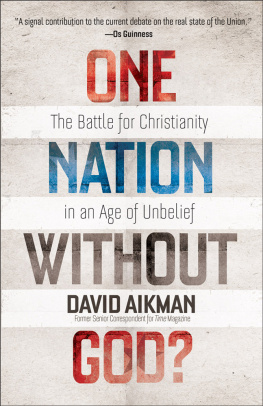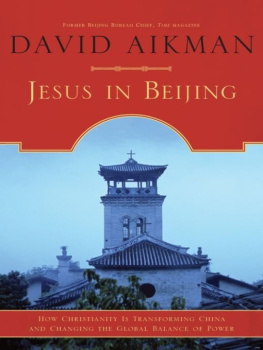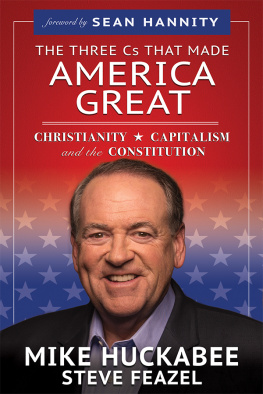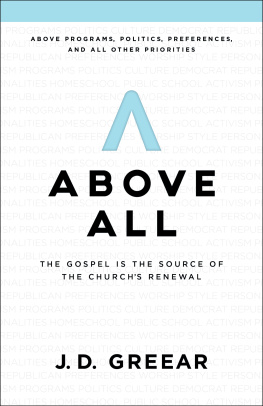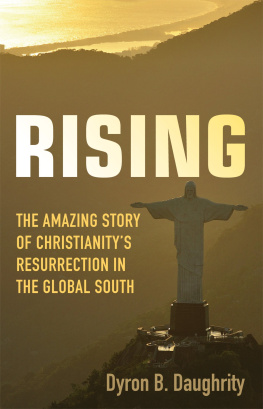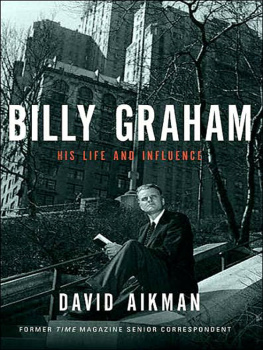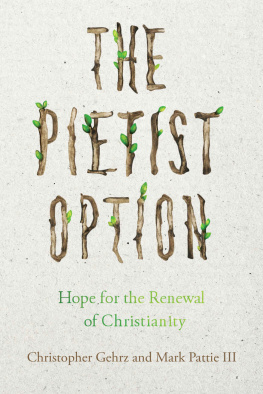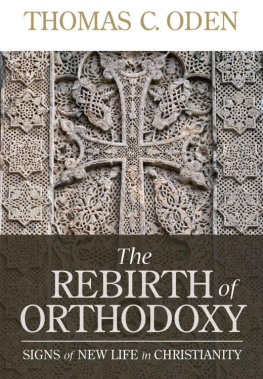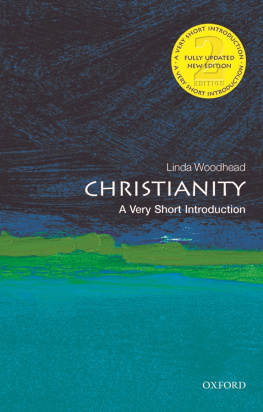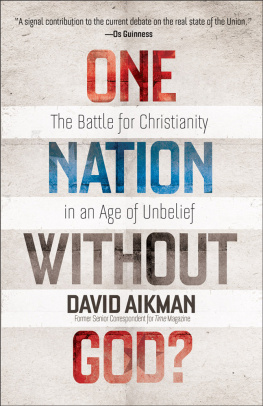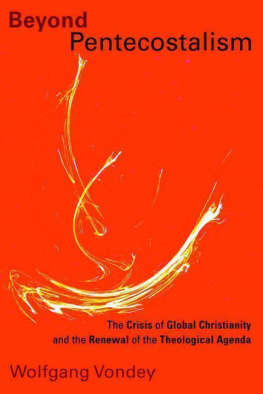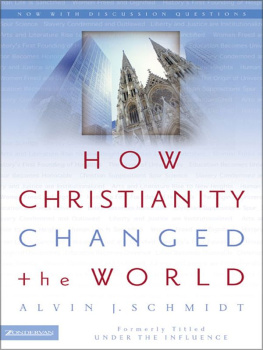
2012 by David Aikman
Published by Baker Books
a division of Baker Publishing Group
P.O. Box 6287, Grand Rapids, MI 49516-6287
www.bakerbooks.com
Ebook edition created 2012
All rights reserved. No part of this publication may be reproduced, stored in a retrieval system, or transmitted in any form or by any meansfor example, electronic, photocopy, recordingwithout the prior written permission of the publisher. The only exception is brief quotations in printed reviews.
ISBN 978-1-4412-3584-8
Library of Congress Cataloging-in-Publication Data is on file at the Library of Congress, Washington, DC.
Scripture quotations are from the King James Version of the Bible.
The internet addresses, email addresses, and phone numbers in this book are accurate at the time of publication. They are provided as a resource. Baker Publishing Group does not endorse them or vouch for their content or permanence.
Published in association with the Barbara Casey Literary Agency, Trion, Georgia.
Never losing his seasoned reporters eye for detail, Aikman steps back to develop a wide-angle view of history and addresses a burning issue for America. A signal contribution to the current debate on the real state of the Union.
Os Guinness, author of A Free Peoples Suicide
Readers searching for a succinct overview of the Christian role in Americas past and present will relish David Aikmans balanced assessments and mellifluous prose.
Dr. Marvin Olasky, editor-in-chief, World
In this stimulating book, David Aikman deftly assesses Americas religious heritage and the possible consequences should Americans turn away from that heritage. From the founding of the early American colonies to contemporary trends in media and university life, Aikman offers an excellent introduction to a range of vital issues that have helped spawn todays culture wars.
Thomas S. Kidd, associate professor of history at Baylor University and author of Patrick Henry: First Among Patriots
David Aikmans excellent book comes amid strenuous arguments about whether the United States is or was a Christian country and whether it could or should be one. These debates often ignore the complexity of Christianitys varying role in our history and are notably vague about what it might actually mean for America to be Christian. In this setting One Nation without God? clarifies the key issues through a lucid, spirited, and evenhanded overview of Christianitys role in American history and its possible futures. It is necessary reading.
Paul Marshall , author and senior fellow at the Hudson Institutes Center for Religious Freedom
Contents
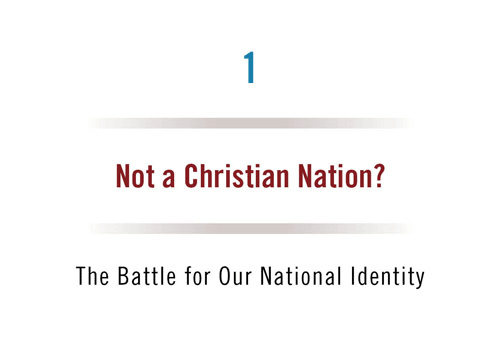
The first trumpet blast came from the president of the United States. It was April 6, 2009, less than three months after Barack Obama was sworn in, hand on a Bible, on the western front of the Capitol, promising to defend the Constitution of the United States. Now in Turkey to conclude a five-nation European tour, Obama was standing with his host, Turkish president Abdullah Gul, at a podium in Ankaras ornate Cankaya Palace answering questions from Turkish, American, and foreign reporters. A Turkish reporter asked him what he intended to do to improve US-Turkish relations, which, the reporter said, had deteriorated under the administration of George W. Bush. Obamas answer was that the United States and Turkey might demonstrate a new model of cooperation. And Ive said before, the president noted, that one of the great strengths of the United States isalthough as I mentioned, we have a very large Christian populationwe do not consider ourselves a Christian nation or a Jewish nation or a Muslim nation; we consider ourselves a nation of citizens who are bound by ideals and a set of values.
Not a Christian Nation?
The blogosphere quickly hummed with these words and excited some disapproving discussion. He has done the country a lot of harm this week, harm that I fear is going to come back and bite us just like misunderstanding our enemies bought us 9-11, a reader named Daneen commented on the site LonelyConservative.com. New Years Day is a federal holiday, though it is not technically part of the Christian Christmas liturgy.
Obamas remarks in Turkey were not the first time he had made this assertion. In June 2007, while still a US senator but having already announced his bid for the presidency, he responded by email to the Christian Broadcasting Networks senior national correspondent David Brody with the comment, Whatever we once were, were no longer just a Christian nation. We are also a Jewish nation, a Muslim nation, a Buddhist nation, and a Hindu nation, and a nation of non-believers.
Other personalities, speaking on the Fox News channel, were even more hostile. Newt Gingrich, the former GOP speaker of the house, asserted that Obama was fundamentally misleading about the nature of America. Fox News anchor Sean Hannity said that he was offended and that Obama was out of touch with the principles that have made this country great. Karl Rove, former senior political advisor under George W. Bush, suggested that Obama had denied the reality that America was founded on faith, though he in fact virtually echoed Obamas own comments. Yeah, look, he added, America is a nation built on faith. I mean, we can be Christian, we can be Jew, we can be Mormon, we can be, you know, any variety of things. Were a country that prizes faith and believes that we are endowed by our Creator with certain inalienable rights; among them are life, liberty, and the pursuit of happiness. As for Fox News host Megyn Kelly, she wondered if Obama had step[ped] on a political landmine. She said, implying she agreed with the idea, that Obama was obviously just pandering. He was in this Muslim nation saying, look, were not a Christian countryand by the way, this is not the first time hes said this. He gave a speech back in June of 2006, according to our records, where he said exactly this, and then again he repeated it the following year.
Other internet comments were even more pointed. On the conservative website Red State, Warner Todd Huston headlined his opinion piece rhetorically by asking, What are we if NOT a Christian nation? He said Obama was simply ingratiating himself with Muslim audiences.
Yet many commentators strongly supported President Obamas assertion, and did so skillfully. Michael Lind, a policy director at the New America Foundation, elaborated a thoughtful argument that conservative critics of Obama had conflated Christianity and natural rights liberalism. Lind argued that automatically identifying the Creator in the Declaration of Independence with the personal god of the Abrahamic religions was wrong because the ideas of natural rights and the social contract inherited by the founders had their origins in Hobbes, Gassendi, and Locke, who themselves drew on themes founded in Greek and Roman philosophy. President Obama... is right, Lind argued. The American republic, as distinct from the American population, is not post-Christian because it was never Christian.
Randall Balmer, professor of American religious history at Barnard College, an editor for Christianity Today magazine, and an Episcopal priest, argued, albeit somewhat defensively, in the Huffington Post that America is not a Christian nation and evangelicals are not hard right. Wallis is a prominent spokesman for what is sometimes called the Christian left and has taken a generally left-leaning political position on both domestic and international issues for three decades or so. He was a prominent opponent of Operation Desert Storm, the first Gulf War to liberate Kuwait from Iraq, and a vociferous critic of anything slightly suggestive of Christian nationalism.
Next page
